Recently, 1,600 'Neder Bananen' (Netherbananas) grown on substrates in greenhouses were harvested as a part of Wageningen University & Research's (WUR) efforts to save the global banana production from the dreaded and advancing Panama disease. The Dutch bananas are not sold on the market; they end up as banana eclairs and in banana beer, but not before they have been ripened by the Groot Fresh Group.
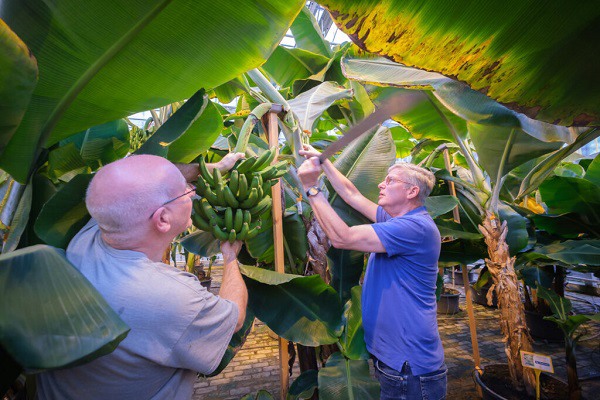
Gert Kema (WUR) harvesting the Neder Banaan, photo by Guy Ackermans
Ripening is an interesting challenge
Now that it has been proven possible to grow bananas in the Netherlands in this innovative way, they still need to be ripened for further processing. This is not done on the plants themselves, but in a ripening cell - just like 'traditional' bananas grown overseas - to ensure even ripening. De Groot Fresh Group will ensure that the harvest is delivered back to Neder Banaan at the right ripeness - an interesting challenge for the company. The starting conditions are quite different from what Neder Banaan is used to, as the growing conditions of these bananas are totally different from those overseas. In addition, these bananas have not had to endure weeks of traveling in a sea container, but rather just a short journey from Ede to Breda (just over 100 kilometers).
Maik de Groot and Marcel from the Groot Fresh Group
Maik de Groot, Director of Ripening and Facility, and Marcel, who is jointly responsible for purchasing, the ripening process, and planning at De Groot Fresh Group, were present at the harvest to give instructions on harvesting and packing the bananas. Maik: "This is a very interesting development and we are keen to follow and support this process."
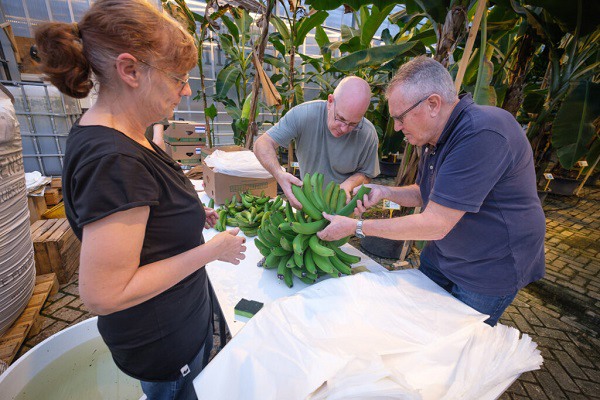
Before being transported to de Groot Fresh Group's ripening rooms, the Neder bananas are carefully packed. Photo by Guy Ackermans
The ripener plays a crucial role in the final result. There are many variables that influence the process, and it takes attention, knowledge, and experience to steer ripening in the right direction. Depending on the initial condition of the banana, a ripener must adjust temperature, ethylene, and time to ensure the banana reaches the right ripeness. Marcel: "A banana is a very sensitive product. Small deviations have major consequences. Once the ripening process has started, it cannot be stopped, but it can be adjusted by closely monitoring the yellowing of the bananas, for example. We do that 24/7."
De Groot Fresh Group had a special sticker made with the Dutch flag
"We have developed our own ripening schedules that are precisely tailored to the various trade flows and customer requirements with as little wastage as possible. A retail customer wants a yellow banana that can be in the shop the next day. For a customer in the wholesale market, bananas need to be a little greener for marketability. This way, we can ensure optimum shelf life in different chains," Maik adds.
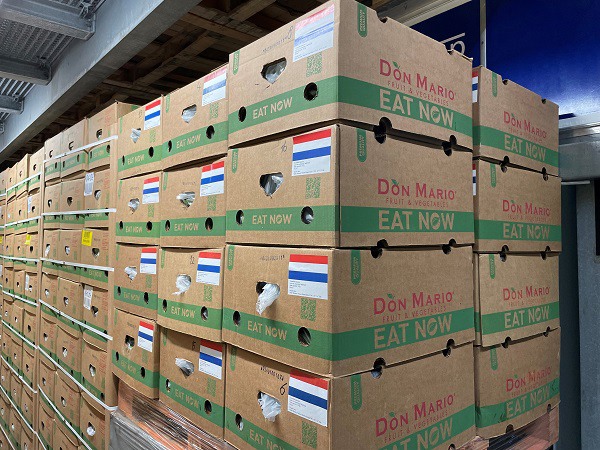
Neder Banaan in the ripening cell at de Groot Fresh Group. Photo by de Groot Fresh Group
Mini eclairs, banana beer, and peels on a bun
After ripening, most Neder Bananas from the greenhouse in Ede end up in mini-eclairs, small banana cakes made by the confectioner Ritmeester. A special beer with Dutch bananas is also being developed in cooperation with Kleiburg. The banana products are distributed via Boerenhart to, among others, catering companies, hotels, and care institutions.
Not only the bananas themselves are used: the peels and the plants on which the bananas grow are also used. The peels are marinated and fried by Banana Business. The result is Pulled Peel, a vegan meat substitute that is delicious in salads or on a sandwich.
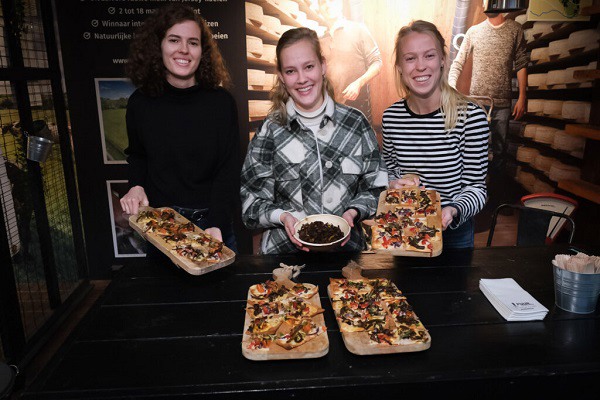
The ladies from Banana Business with Pulled Peel. After marinating and frying, banana peels are great on a sandwich or flamkuche. Photo by Guy Ackermans
The banana plants themselves are also given a sustainable purpose. Musa Intimates makes lingerie from fibers extracted from the stems of the banana plant and Yellow Pallet presses those same fibers into blocks for transport pallets: an environmentally friendly wood substitute.
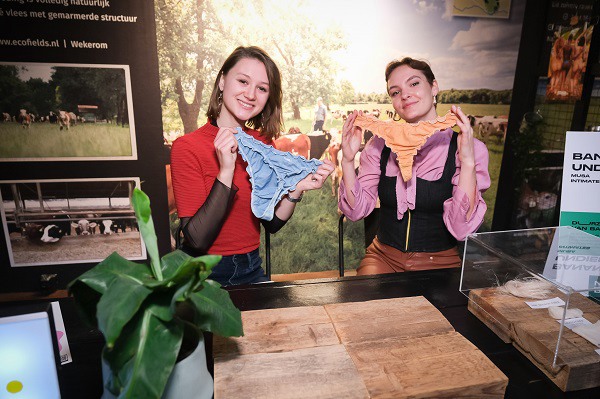
Musa Intimates makes lingerie from fibers from the stems of the banana plant. Photo by Guy Ackermans
From waste to raw material
"At Neder Banaan, we see it as a challenge to really utilize everything in our greenhouse, which is why we have actively sought to collaborate with students and start-ups," says Pieter Vink, director of Neder Banaan. "By using residual streams, fewer new raw materials are needed. Of course we innovate on a small scale, but worldwide there are enormous mountains of plants and banana peels that end up as waste. With the innovations from our greenhouse, we hope to inspire banana growers worldwide and thus contribute to a more sustainable sector."
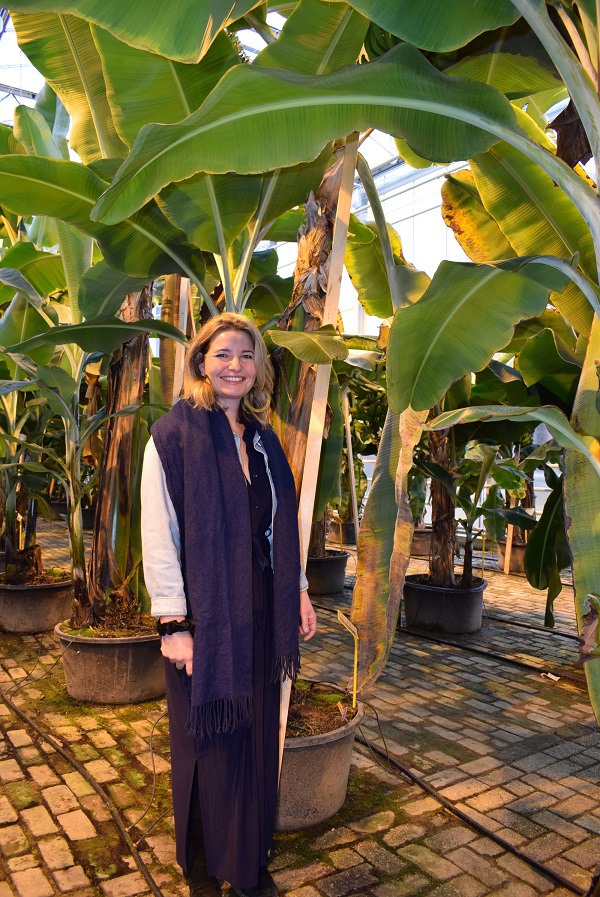
Renata van de Hoef with 'their' banana plant
Saving the banana
The Neder Banaan project was launched three years ago to save the world's banana crop. In the banana greenhouse, bananas are grown on a special substrate of coconut fibers. As a result, the plants are not susceptible to dangerous soil fungi, such as the dreaded Panama disease, which pose a threat to banana cultivation worldwide. Neder Banaan is researching new cultivation methods and banana varieties together with scientists of the WUR. The research is led by Gert Kema, extraordinary professor of Tropical Phytopathology and the spiritual father of the Neder Banaan. The knowledge generated by the research is shared worldwide.
To support the research project, the Neder Bananen can be adopted. "Bananas are one of the most important products for us. They are very popular; there are often twice as many bananas as apples in work fruit deliveries," says Renate van de Hoef of AGF specialist Gijs van de Hoef. That is why they have adopted one of the banana plants.
For more information:
Neder Groep 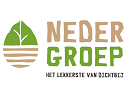
+31 (0)88 1500 700
[email protected]
www.nedergroep.nl
de Groot Fresh Group
+31 (0)73 5998888 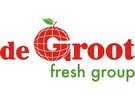
[email protected]
www.degrootfreshgroup.nl
